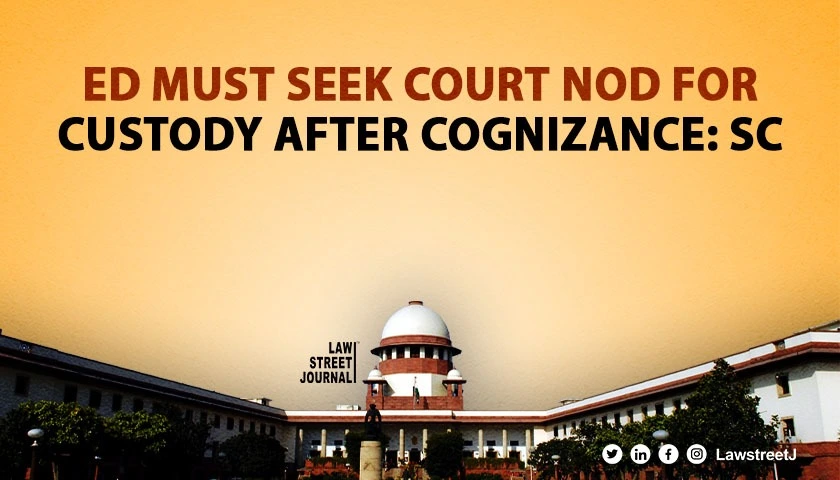NEW DELHI: The Supreme Court has ruled that the Enforcement Directorate can't arrest a person after a court has taken cognizance of a complaint filed under Section 44 of the Prevention of Money Laundering Act and the central agency has to approach the court if it wanted to take custody of the accused.
A bench of Justices Abhay S Oka and Ujjal Bhuyan said, "After cognizance is taken of the offence punishable under Section 4 of the PMLA based on a complaint under Section 44 (1)(b), the ED and its officers are powerless to exercise power under Section 19 to arrest a person shown as an accused in the complaint."
If the ED wanted custody of the accused who appeared after service of summons for conducting further investigation of the same offence, the agency will have to seek custody of the accused by applying to the Special Court, which must pass an order on the application after recording brief reasons, the bench said.
The court clarified if the accused appears on summons, he should not be treated as if he is in custody and therefore, it would not be necessary for him to apply for bail. However, the Special Court may direct for furnishing of a bond in terms of Section 88 CrPC.
In its judgment, the bench dealt with a fact situation where the accused shown in the complaint under Section 44(1)(b) of the PMLA was not arrested by the ED by the exercise of power under Section 19 of the PMLA till the complaint was filed.
It said if the ED wants custody of the accused who appears after service of summons for conducting further investigation in the same offence, the ED will have to seek custody of the accused by applying to the Special Court. After hearing the accused, the Special Court must pass an order on the application by recording brief reasons.
While hearing such an application, the Court may permit custody only if it is satisfied that custodial interrogation at that stage is required, even though the accused was never arrested. However, when the ED wants to conduct a further investigation concerning the same offence, it may arrest a person not shown as an accused in the complaint already filed under Section 44(1)(b), provided the requirements of Section 19 are fulfilled, the bench said.
The court also said if the accused was not arrested by the ED till filing of the complaint, while taking cognizance on a complaint under Section 44(1)(b), as a normal rule, the Court should issue a summons to the accused and not a warrant. Even in a case where the accused is on bail, a summons must be issued.
"It is not mandatory in every case to direct furnishing of bonds. However, if a warrant of arrest has been issued on account of nonappearance or proceedings under Section 82 and/or Section 83 (proclamation) of the CrPC have been issued against an accused, he cannot be let off by taking a bond under Section 88 of the CrPC, and the accused will have to apply for cancellation of the warrant," the bench said.
The court dealt with the legal situation arising with regard to accused shown in the complaint but not arrested by the ED.
Senior advocate Sidharth Luthra appeared for the appellants Tarsem Lal and others and Additional Solicitor General S V Raju for the ED.
The bench set aside the orders declining anticipatory bail and directed for cancellation of warrants with conditions.
Luthra cited the Supreme Court's decision in Satender Kumar Antil, 2021 further clarified in 2022, which held that when during the investigation, the prosecution does not seek the custody of the accused, after the court takes cognizance, there is no need to arrest the accused.
"When the accused is not arrested during the investigation, after he appears before the Special Court pursuant to a summons, it is not necessary for him to apply for bail," he said.

















